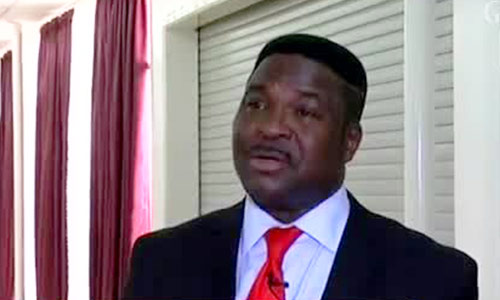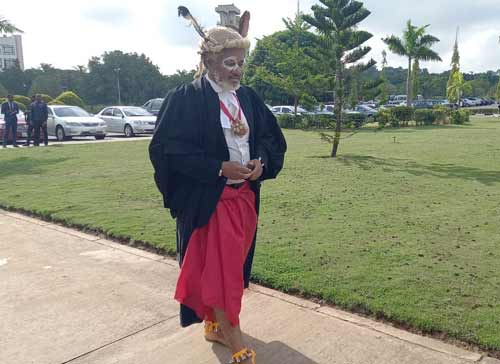Obasanjo’s Position On Rightful Ownership Of Oil In N’Delta Against Natural Justice Says Ozekhome SAN

A senior lawyer and human rights activist, Chief Mike Ozekhome (SAN), yesterday, picked holes in former President Olusegun Obasanjo’s position that the oil found in the Niger Delta belonged to the country and not the region.
Ozekhome argued that as a military top brass, Obasanjo was one of Nigeria’s rulers, who inserted the ‘inhuman’ law, stressing that the provision that the oil found in the Niger Delta was owned by the entire Nigeria was against the law of natural justice.
According to him, although legally speaking, the former Nigerian leader might be correct, the overriding principle that whoever owns the land owns everything therein should equally apply.
In a statement personally signed, the lawyer maintained that ordinarily, a major attribute of federalism is that it ensures that regions, sub-nationals or federating units develop according to their pace and needs, using their God-given resources, they should only pay tax to the central government.
He insisted that a law that literally stole the resources of a people, punishing them with destruction of their only available aquatic and agrarian life, even though in the statute books, was a bad, aberrant and obnoxious law.
“Former president Olusegun Obasanjo has theorised that the oil and gas found in the Niger Delta region belong to the federal government, and not to the oil-bearing communities.
“Legally speaking, Obasanjo can be said to be correct, because he was part and parcel of successive military juntas that cleverly and systematically inserted ‘expropriatory’ and inhuman laws concerning ownership of oil and gas into our statute books.
“But, does that make such laws right or justifiable? No. I think not. Ex-president Obasanjo should be told in very clear terms that there is such an overriding principle of law, which goes with the maxim of quic quid plantatatur solo solo cedit. This literally means that whoever owns the land owns everything on top of it.
“Any extant constitutional or statutory provisions (such as those apparently referred to by Obasanjo) that run contrary to this ‘commonsensical’ common law principle are therefore nothing but bad, immoral, ‘expropriatory’ and exploitative,” he argued.
He explained that in the United States, for instance, a country from which Nigeria adopted its system of government, since oil was discovered in 1859, oil and gas have never been owned by the American federal government, but by the surface owners.
Ozekhome pointed out that oil and gas offshore could be owned either by states or federal government in that country.
According to him, before the January 15, 1967 first military putsch led by Maj. Kaduna Nzeogwu , neither the cotton, groundnut and hides and skin obtainable in the north, the cocoa grown in the west, palm produce in the east; nor the rubber and timber that existed in the then mid-west, were said to belong to the federal government.
“They belonged to the regions that took a lion 50 per cent share, while paying tax to the federal government at the centre. What has changed? Nothing, I believe,” he stressed.
He reminded the ex-Nigerian leader that the major reason his 2005 political reform conference failed was because of the rancour and ruckus generated by the thorny and still unsolved controversy of resource control.
“He should remember that this led the South-south delegates to stage a walkout from the conference. I was not only a civil society delegate, I was actually the head of the civil society unit that drafted our final committee report and recommendations.
“Obasanjo should, therefore, not have dismissed such a festering thorny issue as oil and gas and bleeding oil-bearing communities with a wave of the hand in a most provocative and cavalier manner,” he argued.
Ozekhome explained that the 1960 independence constitution and the 1963 republican constitutions had actually activated true fiscal federalism, after the 1957-1958 Willinks Commission report, which had identified and validated the fears of minorities within the Nigerian space.
He told Obasanjo that the failure of the 1922 Hugh Clifford Constitution, 1946 Arthur Richards Constitution, 1951 Macpherson Constitution and 1954 Littleton Constitution, werepartly ascribed to the overbearing influence of majority tribes over the minority ones.
As an elder statesman, former military head of state and former democratic president, Ozekhome said Obasanjo’s well respected public statements and opinions (which he is constitutionally entitled to), “should be generously garnished with unifying, healing, therapeutic and inclusive flavour, and not with the vinegar of divisive and provocative statements.”
He maintained that the Niger Delta region had been repressed, suppressed, marginalised and neglected, and that Obasanjo, more than any other person, knew this very well, having had the rare privilege of governing Nigeria both in khaki and agbada.
“The poor people have had to pay with their sweat, sorrow, tears, blood, pains and pangs, over their God-given wealth. The wealth has become a curse rather than a blessing.
“I wholly disagree with Obasanjo’s thesis. I’ll rather embrace wholly Pa E.K. Clark’s antithesis, which wears a human face,” Ozekhome maintained.



